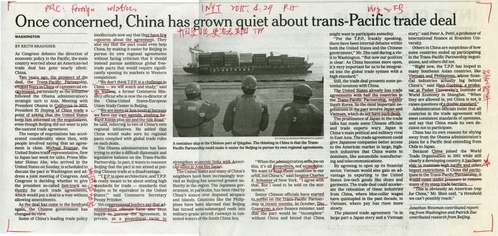close
Once Concerned, China Has Grown Quiet about Trans-Pacific Trade Deal
Keith Bradsher, New York Times , APRIL 28, 2015
http://www.nytimes.com/2015/04/29/business/international/once-concerned-china-is-quiet-about-trans-pacific-trade-deal.html
Keith Bradsher, New York Times , APRIL 28, 2015
http://www.nytimes.com/2015/04/29/business/international/once-concerned-china-is-quiet-about-trans-pacific-trade-deal.html
- 北京原先很在意美國將成立的TPP。
- 最近北京已不大在乎TPP的發展。
- 大概是亞投行成立時轟動成功使北京更有自信。
林中斌 2015年5月11日

WASHINGTON — As Congress debates the direction of economic policy in the Pacific, the main country worried about an American-led trade deal has gone nearly silent: China.
Two years ago, the prospect of the deal, the Trans-Pacific Partnership, evoked fears in China of commercial encirclement, particularly as the initiative followed the Obama administration’s strategic turn to Asia. Meeting with President Obama in California in 2013, President Xi Jinping of China made a point of asking that the United States keep him informed on the negotiations, even though Beijing did not want to join the nascent trade agreement.
The tempo of negotiations has accelerated considerably since then, with people involved saying that an agreement is close. Michael Froman, the United States trade representative, flew to Japan last week for talks. Prime Minister Shinzo Abe, who arrived in the United States on Sunday, is scheduled to discuss the pact in Washington and address a joint meeting of Congress. And Congress is deciding whether to give the president fast-track authority for such trade agreements, which would put a deal to a vote without allowing amendments.
President Obama and Prime Minister Shinzo Abe of Japan are scheduled to discuss the Trans-Pacific Partnership in Washington this week. Credit Reuters
As the deal has come to the forefront again, the Chinese government has changed its view.
Some of China’s leading trade policy intellectuals now say that they have few concerns about the agreement. They also say that the pact could even help China, by making it easier for Beijing to pursue its own regional agreements without facing criticism that it should instead pursue ambitious global free trade pacts that would require significantly opening its markets to Western competition.
“We don’t think T.P.P. is a challenge to China — we will watch and study,” said He Weiwen, a former Commerce Ministry official who is now the co-director of the China-United States-European Union Study Center in Beijing.
“We are more or less neutral because we have our own agenda, pushing forward Asean plus six and the Silk Road,” he said, referring to two of China’s own regional initiatives. He added that China would make sure its regional pacts complied with global free trade rules on such deals.
The Obama administration has been trying to strike a difficult diplomatic and legislative balance on the Trans-Pacific Partnership. In part, it wants to reassure Beijing that the pact is not aimed at putting Chinese trade at a disadvantage.
“T.P.P. is open architecture, and T.P.P. is really meant to be about setting high standards for trade — standards that aspire to be equivalent to the United States’,” said Commerce Secretary Penny Pritzker.
Yet congressional leaders say that administration officials have also been happy to portray the agreement, in private, as a geopolitical tactic to strengthen economic links with American allies in Asia like Japan.
The United States and many of China’s neighbors have been increasingly worried as Beijing has asserted greater authority in the region. The Japanese government, in particular, has been riled by China’s stance over disputed airspace and islands. Countries like the Philippines have been alarmed that Beijing has turned semi-submerged reefs into military-grade aircraft runways in contested waters of the South China Sea.
“When the administration sells me on this, it’s all geopolitics, not economics: We want to keep these countries in our orbit, not China’s,” said Senator Charles E. Schumer of New York. “I agree with that. But I need to be sold on the economics.”
Senior Chinese officials have started to soften on the Trans-Pacific Partnership in recent months. In October, Zhu Guangyao, a vice finance minister, said that the pact would be “incomplete” without China, and hinted that China might want to participate someday.
“For the T.P.P., frankly speaking, there have been internal debates within both the United States and the Chinese government,” Mr. Zhu said during a visit to Washington. “But now our position is clear: As China becomes more open, it’s very important for us to be integrated into the global trade system with a high standard.”
Still, the trade deal presents some potential tensions for China.
The United States already has free trade agreements with half the countries in the Trans-Pacific Partnership. So the most important negotiations in the pact involve Japan and Vietnam, which do not have such deals.
The prominence of Japan in the trade talks has made some Chinese officials and trade experts wary. Japan is China’s main political and military rival in East Asia. The free trade agreement could give Japanese companies better access to the American market in large, high-tech industries that China wants to dominate, like automobile manufacturing and telecommunications.
By agreeing to open up its financial sector, Vietnam would also gain an advantage in exporting to the United States in a range of low-tech goods like shoes and garments. The trade deal could accelerate the relocation of these industries from China, where blue-collar wages have quintupled in the last decade, to Vietnam, where pay has risen more slowly.
The planned trade agreement “is in large part a Japan story and a Vietnam story,” said Peter A. Petri, a professor of international finance at Brandeis University.
Others in China are suspicious of how some countries ended up participating in the T.P.P. negotiations and others did not.
“Right now, the T.P.P. has looped in many Southeast Asian countries, like Vietnam and Philippines, whose financial industries actually lag behind China’s,” said Shen Guobing, a professor at Fudan University’s Institute of World Economy in Shanghai. “When they are allowed in, yet China is not, it raises questions of a double standard.”
Administration officials insist that all countries in the trade agreement will meet consistent standards of openness, and say that China made its own decision not to participate.
China has its own reasons for shying away from a trans-Pacific trade deal extending from Chile to Japan.
Because China joined the World Trade Organization while still clearly a developing country in 2001, it has been able to maintain high tariffs and other import restrictions. If China did participate in the Trans-Pacific Partnership, it would come under pressure to remove many of its steep trade barriers.
“This is obviously an American trap for China,” Mr. Shen said, “a threshold we can’t possibly reach.”
全站熱搜


 留言列表
留言列表


